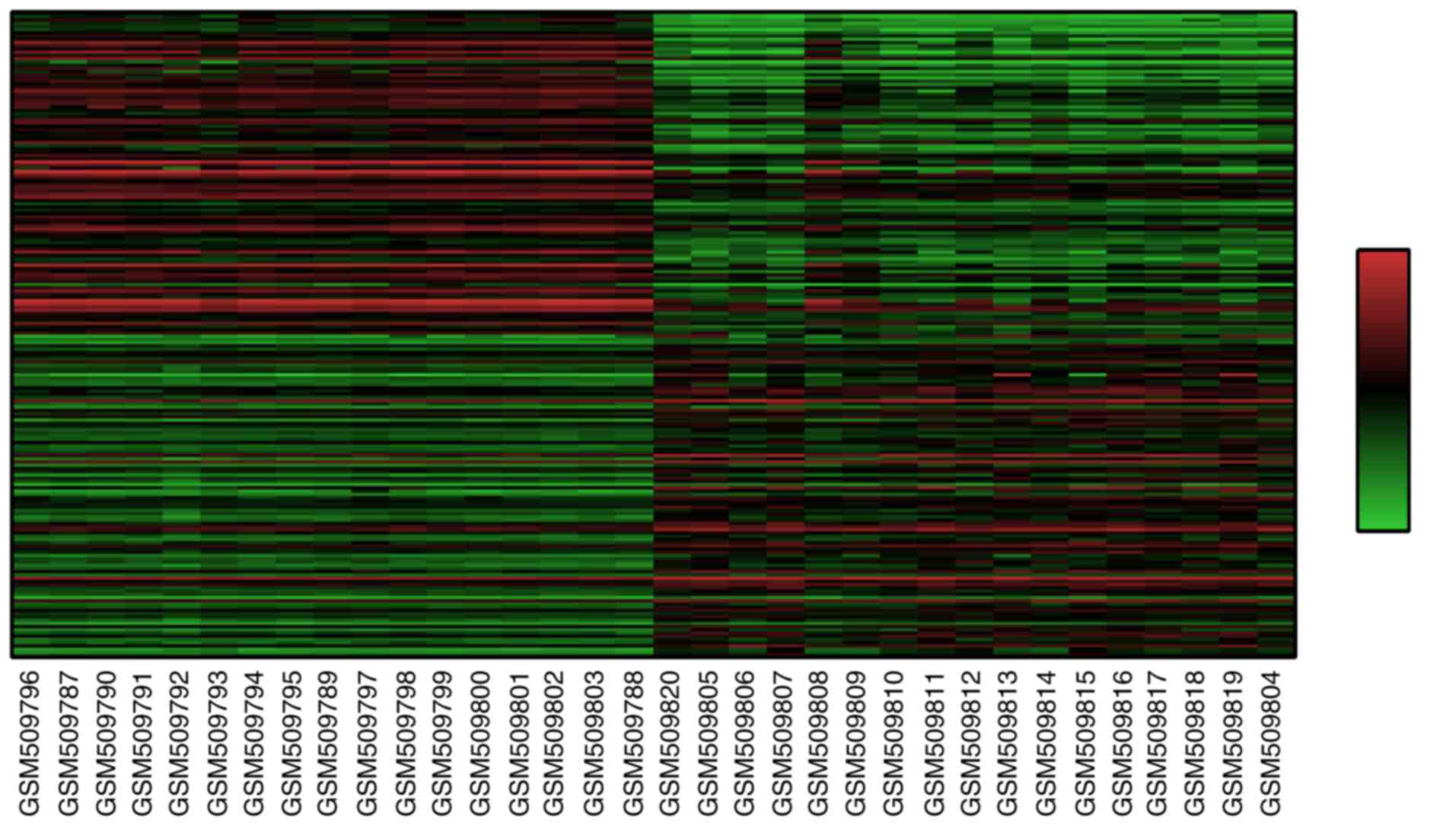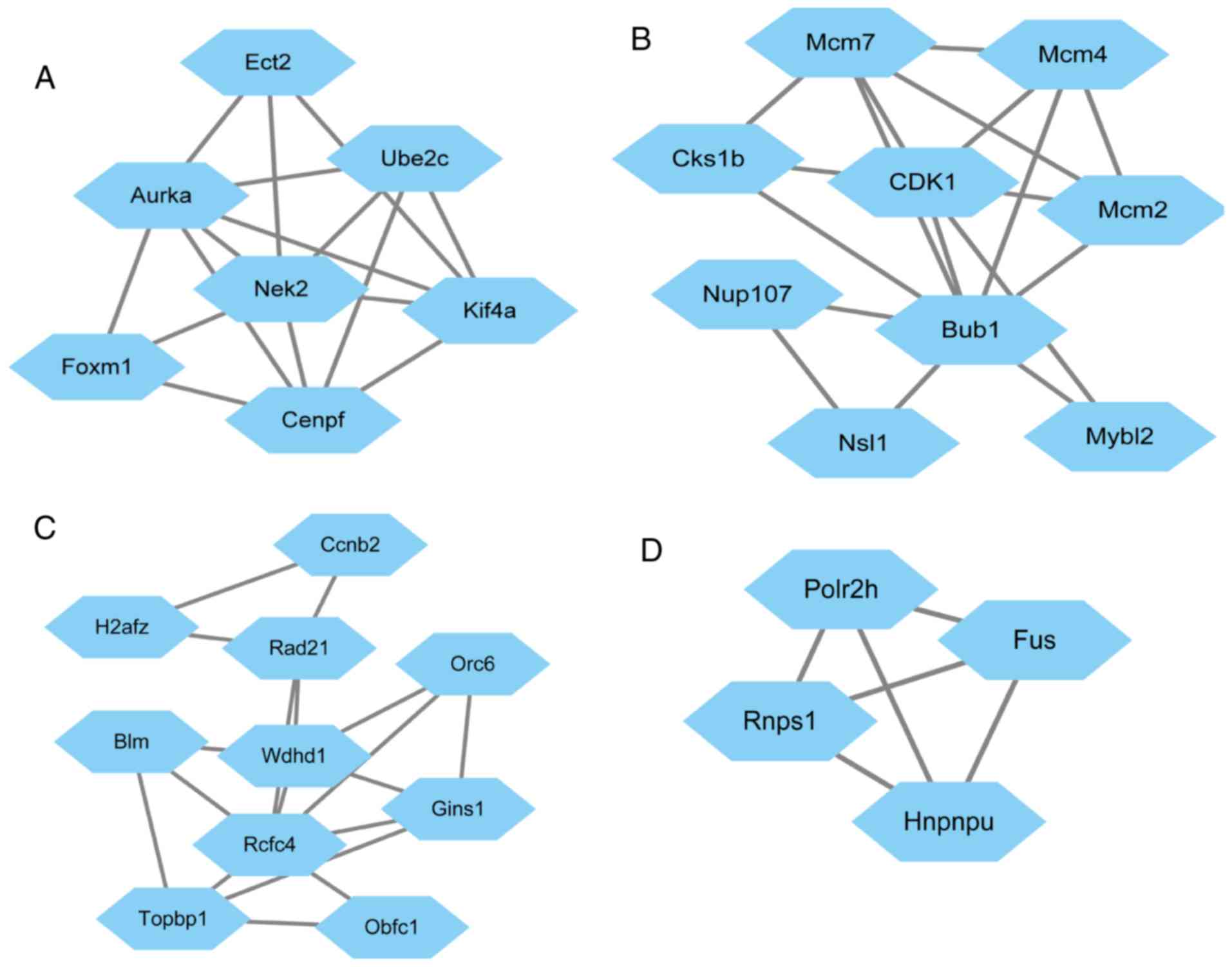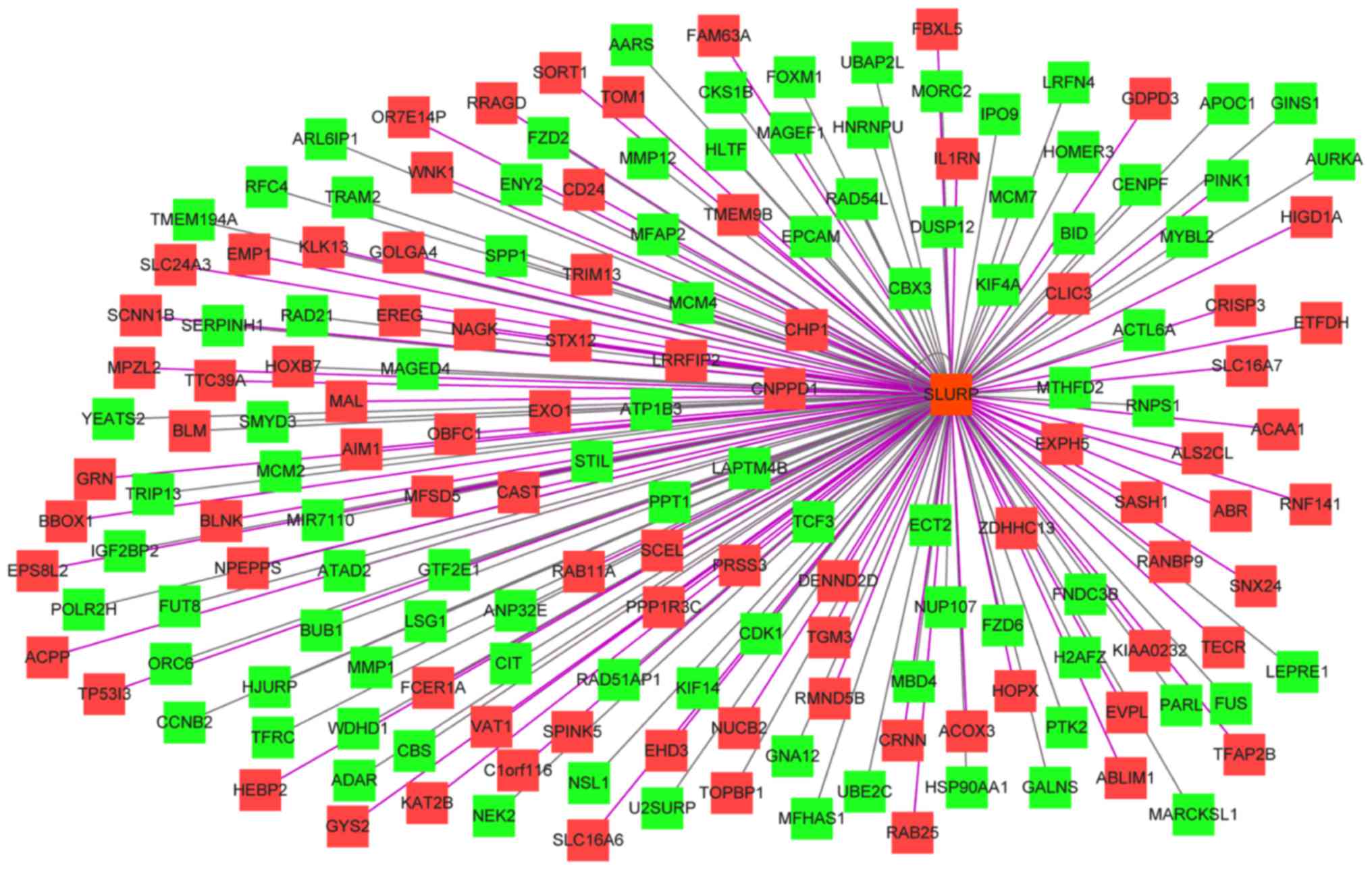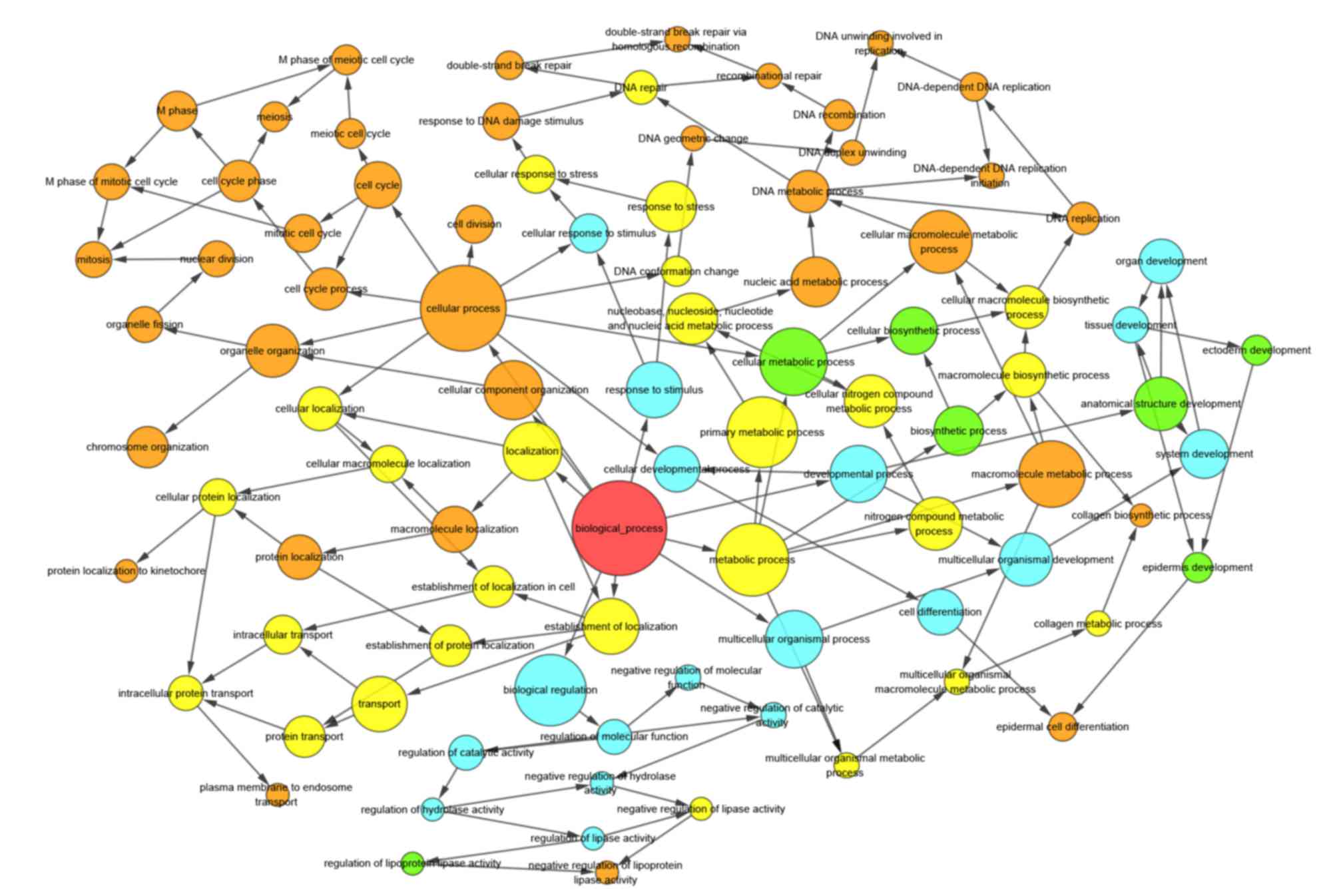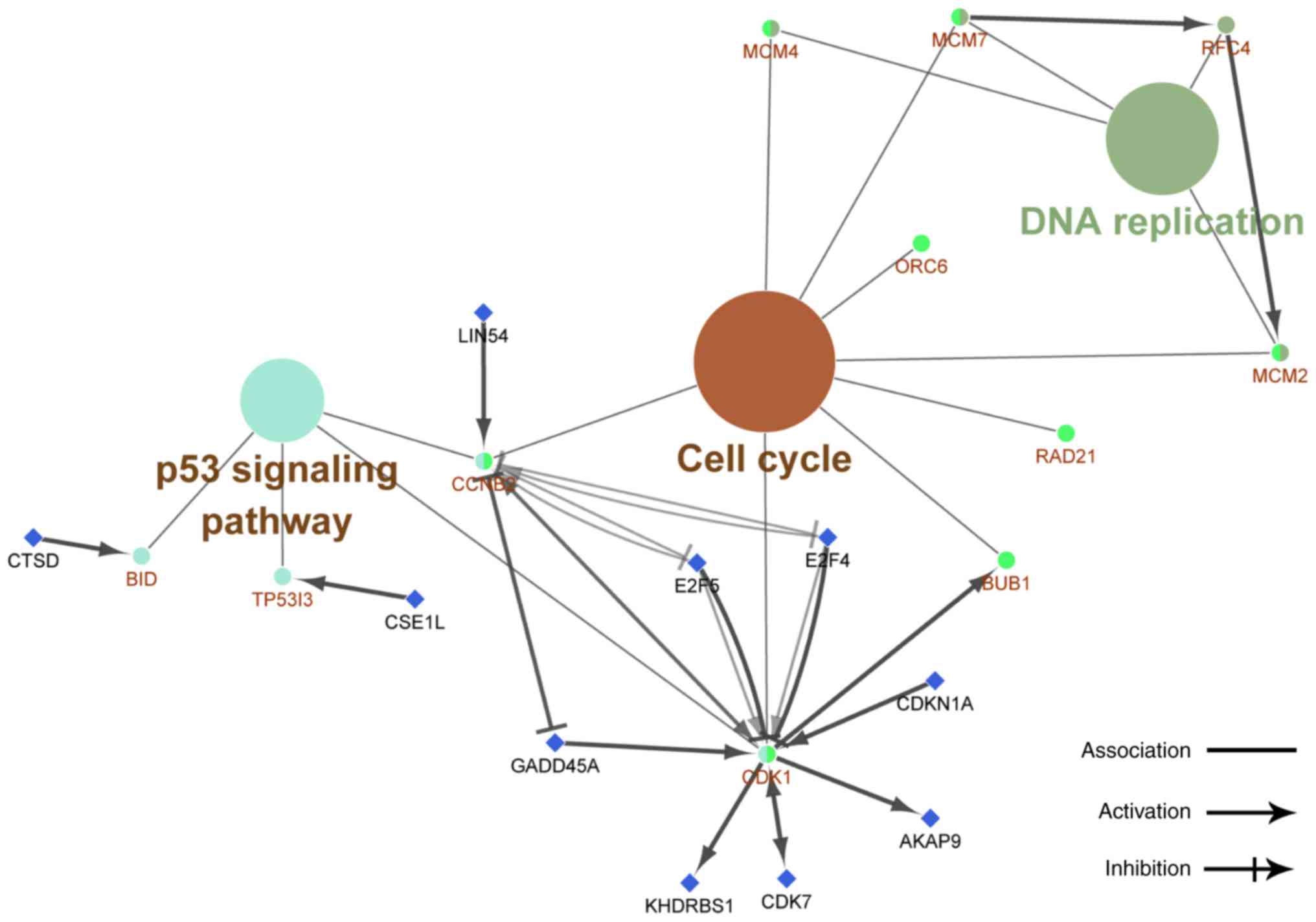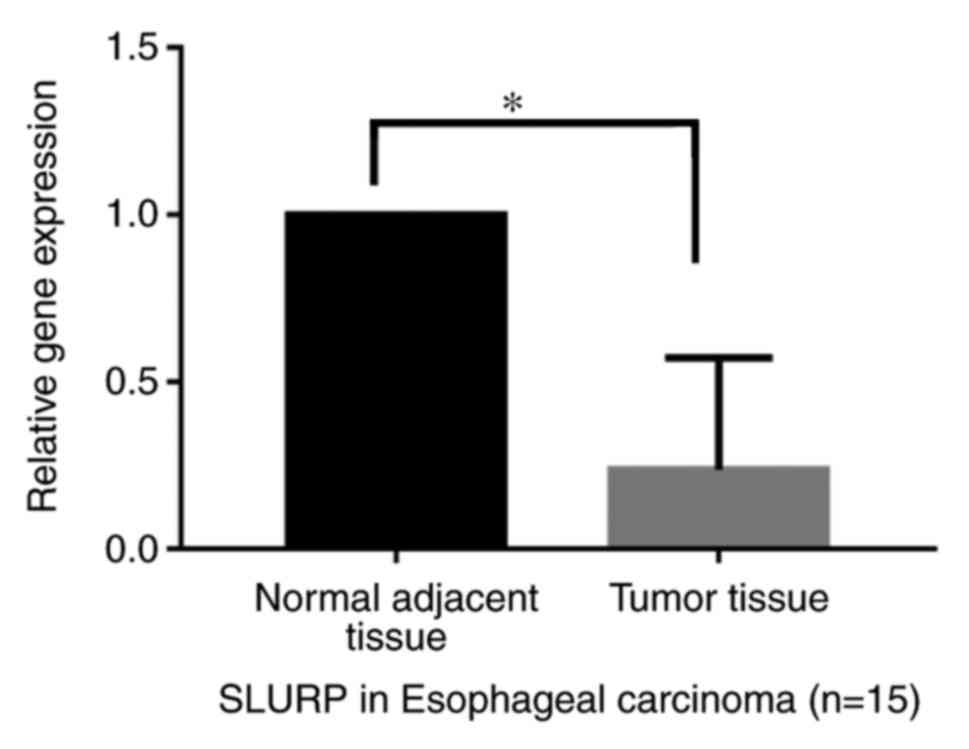|
1
|
Chen W, Zheng R, Zhang S, Zeng H, Xia C,
Zuo T, Yang Z, Zou X and He J: Cancer incidence and mortality in
China, 2013. Cancer Lett. 401:63–71. 2017. View Article : Google Scholar : PubMed/NCBI
|
|
2
|
Tran GD, Sun XD, Abnet CC, Fan JH, Dawsey
SM, Dong ZW, Mark SD, Qiao YL and Taylor PR: Prospective study of
risk factors for esophageal and gastric cancers in the Linxian
general population trial cohort in China. Int J Cancer.
113:456–463. 2005. View Article : Google Scholar : PubMed/NCBI
|
|
3
|
Yang Q, Wang YX, He M, Li J, Qi Z, Zhu SC
and Qiao XY: Factors affecting on long-time survival in patients
with stageIII thoracic esophageal carcinoma after esophagectomy.
Zhonghua Zhong Liu Za Zhi. 38:530–537. 2016.(In Chinese).
PubMed/NCBI
|
|
4
|
Yu S, Zhang W, Ni W, Xiao Z, Wang X, Zhou
Z, Feng Q, Chen D, Liang J, Fang D, et al: Nomogram and recursive
partitioning analysis to predict overall survival in patients with
stage IIB-III thoracic esophageal squamous cell carcinoma after
esophagectomy. Oncotarget. 7:55211–55221. 2016. View Article : Google Scholar : PubMed/NCBI
|
|
5
|
Yi Y, Lu X, Chen J, Jiao C, Zhong J, Song
Z, Yu X and Lin B: Downregulated miR-486-5p acts as a tumor
suppressor in esophageal squamous cell carcinoma. Exp Ther Med.
12:3411–3416. 2016. View Article : Google Scholar : PubMed/NCBI
|
|
6
|
Osako Y, Seki N, Kita Y, Yonemori K,
Koshizuka K, Kurozumi A, Omoto I, Sasaki K, Uchikado Y, Kurahara H,
et al: Regulation of MMP13 by antitumor microRNA-375 markedly
inhibits cancer cell migration and invasion in esophageal squamous
cell carcinoma. Int J Oncol. 49:2255–2264. 2016. View Article : Google Scholar : PubMed/NCBI
|
|
7
|
Zuo J, Wang D, Shen H, Liu F, Han J and
Zhang X: MicroRNA-153 inhibits tumor progression in esophageal
squamous cell carcinoma by targeting SNAI1. Tumour Biol. Oct
13–2016.(Epub ahead of print). View Article : Google Scholar
|
|
8
|
Jing C, Ma G, LiX, Wu X, Huang F, Liu K
and Liu Z: MicroRNA-17/20a impedes migration and invasion via
TGF-β/ITGB6 pathway in esophageal squamous cell carcinoma. Am J
Cancer Res. 6:1549–1562. 2016.PubMed/NCBI
|
|
9
|
Hu N, Wang C, Clifford RJ, Yang HH, Su H,
Wang L, Wang Y, Xu Y, Tang ZZ, Ding T, et al: Integrative genomics
analysis of genes with biallelic loss and its relation to the
expression of mRNA and micro-RNA in esophageal squamous cell
carcinoma. BMC Genomics. 16:7322015. View Article : Google Scholar : PubMed/NCBI
|
|
10
|
Hu N, Clifford RJ, Yang HH, Wang C,
Goldstein AM, Ding T, Taylor PR and Lee MP: Genome wide analysis of
DNA copy number neutral loss of heterozygosity (CNNLOH) and its
relation to gene expression in esophageal squamous cell carcinoma.
BMC Genomics. 11:5762010. View Article : Google Scholar : PubMed/NCBI
|
|
11
|
Garner E, Wallace JS, Argoty GA, Wilkinson
C, Fahrenfeld N, Heath LS, Zhang L, Arabi M, Aga DS and Pruden A:
Metagenomic profiling of historic Colorado Front Range flood impact
on distribution of riverine antibiotic resistance genes. Sci Rep.
6:384322016. View Article : Google Scholar : PubMed/NCBI
|
|
12
|
Dennis G Jr, Sherman BT, Hosack DA, Yang
J, Gao W, Lane HC and Lempicki RA: DAVID: Database for annotation,
visualization, and integrated discovery. GenomeBiol. 4:P32003.
|
|
13
|
Torto-Alalibo T, Purwantini E, Lomax J,
Setubal JC, Mukhopadhyay B and Tyler BM: Genetic resources for
advanced biofuel production described with the Gene Ontology. Front
Microbiol. 5:5282014. View Article : Google Scholar : PubMed/NCBI
|
|
14
|
Ashburner M, Ball CA, Blake JA, Botstein
D, Butler H, Cherry JM, Davis AP, Dolinski K, Dwight SS, Eppig JT,
et al: Gene ontology: Tool for the unification of biology. The gene
ontology consortium. Nat Genet. 25:25–29. 2000.
|
|
15
|
Du J, Yuan Z, Ma Z, Song J, Xie X and Chen
Y: KEGG-PATH: Kyotoencydopedia of genes and genomes-based pathway
analysis using a path analysis model. MolBiosyst. 10:2441–14447.
2014.
|
|
16
|
Kanehisa M and Goto S: KEGG:
Kyotoencyclopedia of genes and genomes. Nucleic Acids Res.
28:27–30. 2000. View Article : Google Scholar : PubMed/NCBI
|
|
17
|
Maere S, Heymans K and Kuiper M: BiNGO: A
Cytoscape plugin to assess overrepresentation of gene ontology
categories in biological networks. Bioinformatics. 21:3448–9344.
2005. View Article : Google Scholar : PubMed/NCBI
|
|
18
|
Livak KJ and Schmittgen TD: Analysis of
relative gene expression data using real-time quantitative PCR and
the 2(-Delta Delta C(T)) method. Methods. 25:402–408. 2001.
View Article : Google Scholar : PubMed/NCBI
|
|
19
|
Ren K, Li Y, Lu H, Li Z, Li Z, Wu K, Li Z
and Han X: Long Noncoding RNA HOTAIR Controls Cell Cycle by
Functioning as a Competing Endogenous RNA in Esophageal Squamous
Cell Carcinoma. Transl Oncol. 9:489–497. 2016. View Article : Google Scholar : PubMed/NCBI
|
|
20
|
Zhang HF, Alshareef A, Wu C, Jiao JW,
Sorensen PH, Lai R, Xu LY and Li EM: miR-200b induces cell cycle
arrest and represses cell growth in esophageal squamous cell
carcinoma. Carcinogenesis. 37:858–869. 2016. View Article : Google Scholar : PubMed/NCBI
|
|
21
|
Cao J, Ge MH and Ling ZQ: Fbxw7 tumor
suppressor: A vital regulator contributes to human tumorigenesis.
Medicine (Baltimore). 95:e24962016. View Article : Google Scholar : PubMed/NCBI
|
|
22
|
Costa C, Santos M, Martínez-Fernández M,
Lorz C, Lázaro S and Paramio JM: Deregulation of the pRb-E2F4 axis
alters epidermal homeostasis and favors tumor development.
Oncotarget. 7:75712–75728. 2016. View Article : Google Scholar : PubMed/NCBI
|
|
23
|
Lambot MA, Peny MO, Fayt I, Haot J and
Noël JC: Overexpression of 27-kDa heat shock protein relates to
poor histological differentiation in human oesophageal squamous
cell carcinoma. Histopathology. 36:326–330. 2000. View Article : Google Scholar : PubMed/NCBI
|
|
24
|
Xia W, Qiu M, Chen R, Wang S, Leng X, Wang
J, Xu Y, Hu J, Dong G, Xu PL, et al: CCircular RNA has_circ_0067934
is upregulated in esophageal squamous cell carcinoma and promoted
proliferation. Sci Rep. 6:355762016. View Article : Google Scholar : PubMed/NCBI
|
|
25
|
Xu Y, Qiu M, Chen Y, Wang J, Xia W, Mao Q,
Yang L, Li M, Jiang F, Xu L and Yin R: Long noncoding RNA, tissue
differentiation-inducing nonprotein coding RNA is upregulated and
promotes development of esophageal squamous cell carcinoma. Dis
Esophagus. 29:950–958. 2016. View Article : Google Scholar : PubMed/NCBI
|
|
26
|
Zhi H, Zhang J, Hu G, Lu J, Wang X, Zhou
C, Wu M and Liu Z: The deregulation of arachidonic acid
metabolism-related genes in human esophageal squamous cell
carcinoma. Int J Cancer. 106:327–333. 2003. View Article : Google Scholar : PubMed/NCBI
|
|
27
|
Mao Y, Li L, Liu J, Wang L and Zhou Y:
MiR-495 inhibits esophageal squamous cell carcinoma progression by
targeting Akt1. Oncotarget. 7:51223–51236. 2016. View Article : Google Scholar : PubMed/NCBI
|
|
28
|
Zeng LS, Yang XZ, Wen YF, Mail SJ, Wang
MH, Zhang MY, Zheng XF and Wang HY: Overexpressed HDAC4 is
associated with poor survival and promotes tumor progression in
esophageal carcinoma. Aging (Albany NY). 8:1236–1249. 2016.
View Article : Google Scholar : PubMed/NCBI
|
|
29
|
Luo J, Zhang C, Wang C, Li L, Li C, Li Q,
Zhang M and Wu Q: Miz-1 promotes the proliferation of esophageal
cancer cells via suppression of p21 and release of p21-arrested
cyclin D1. Oncol Rep. 35:3532–3540. 2016. View Article : Google Scholar : PubMed/NCBI
|
|
30
|
Lin DC, Shi ZZ, Xue LY, Chen W, Xu X, Han
YL, Lv N and Wang MR: Expression of cell cycle related proteins
cyclin D1, p53 and p21WAF1/Cip1 in esophageal squamous cell
carcinoma. Yi Chuan. 32:455–460. 2010.(In Chinese). View Article : Google Scholar : PubMed/NCBI
|
|
31
|
Lang E, Zelenak C, Eberhard M, Bissinger
R, Rotte A, Ghashghaeinia M, Lupescu A, Lang F and Qadri SM: Impact
of cyclin-dependent kinase CDK4 inhibition on eryptosis. Cell
Physiol Biochem. 37:1178–1186. 2015. View Article : Google Scholar : PubMed/NCBI
|
|
32
|
Breit C, Bange T, Petrovic A, Weir JR,
Müller F, Vogt D and Musacchio A: Role of intrinsic and extrinsic
factors in the regulation of the mitotic checkpoint kinase Bub1.
PLoS One. 10:e01446732015. View Article : Google Scholar : PubMed/NCBI
|
|
33
|
Takashima S, Saito H, Takahashi N, Imai K,
Kudo S, Atari M, Saito Y, Motoyama S and Minamiya Y: Strong
expression of cyclin B2 mRNA correlates with a poor prognosis in
patients with non-small cell lung cancer. Tumour Biol.
35:4257–4265. 2014. View Article : Google Scholar : PubMed/NCBI
|
|
34
|
Chen JT, Younusi A, Cao L, Tian Z, Zhou YJ
and Song XH: Potential role of heat-shock proteins in giant cell
tumors. Genet Mol Res. 14:19144–19154. 2015. View Article : Google Scholar : PubMed/NCBI
|
|
35
|
Kim SR, Kim KB, Chae YC, Park JW and Seo
SB: H3S10 phosphorylation-mediated transcriptional regulation by
Aurora kinase A. Biochem Biophys Res Commun. 469:22–28. 2016.
View Article : Google Scholar : PubMed/NCBI
|
|
36
|
Kusakabe M, Oku H, Matsuda R, Hori T, Muto
A, Igarashi K, Fukagawa T and Harata M: Genetic complementation
analysis showed distinct contributions of the N-terminal tail of
H2A.Z to epigenetic regulations. Genes Cells. 21:122–135. 2016.
View Article : Google Scholar : PubMed/NCBI
|
|
37
|
Arai M, Kondoh N, Imazeki N, Hada A,
Hatsuse K, Matsubara O and Yamamoto M: The knockdown of endogenous
replication factor C4 decreases the growth and enhances the
chemosensitivity of hepatocellular carcinoma cells. Liver Int.
29:55–62. 2009. View Article : Google Scholar : PubMed/NCBI
|
|
38
|
Ishibashi Y, Kinugasa T, Akagi Y, Ohchi T,
Gotanda Y, Tanaka N, Fujino S, Yuge K, Kibe S, Yoshida N, et al:
Minichromosome maintenance protein 7 is a risk factor for
recurrence in patients with Dukes C colorectal cancer. Anticancer
Res. 34:4569–4575. 2014.PubMed/NCBI
|
|
39
|
Watanabe E, Ohara R and Ishimi Y: Effect
of an MCM4 mutation that causes tumours in mouse on human MCM4/6/7
complex formation. J Biochem. 152:191–198. 2012. View Article : Google Scholar : PubMed/NCBI
|
|
40
|
Razavi SM, Jafari M, Heidarpoor M and
Khalesi S: Minichromosome maintenance-2 (MCM2) expression
differentiates oral squamous cell carcinoma from pre-cancerous
lesions. Malays J Pathol. 37:253–258. 2015.PubMed/NCBI
|
|
41
|
Su P, Wen S, Zhang Y, Li Y, Xu Y, Zhu Y,
Lv H, Zhang F, Wang M and Tian Z: Identification of the key genes
and pathways in esophageal carcinoma. Gastroenterol Res Pract.
2016:29681062016. View Article : Google Scholar : PubMed/NCBI
|
|
42
|
Li L, Wang W, Li X and Gao T: Association
of ECRG4 with PLK1, CDK4, PLOD1 and PLOD2 in esophageal squamous
cell carcinoma. Am J Transl Res. 9:3741–3748. 2017.PubMed/NCBI
|
|
43
|
Wang J, Li Q, Yuan J, Wang J, Chen Z, Liu
Z, Li Z, Lai Y, Gao J and Shen L: CDK4/6 inhibitor-SHR6390 exerts
potent antitumor activity in esophageal squamous cell carcinoma by
inhibiting phosphorylated Rb and inducing G1 cell cycle arrest. J
Transl Med. 15:1272017. View Article : Google Scholar : PubMed/NCBI
|
|
44
|
Wang X, Li X, Li C, He C, Ren B, Deng Q,
Gao W and Wang B: Aurora-A modulates MMP-2 expression via AKT/NF-κB
pathway in esophageal squamous cell carcinoma cells. Acta Biochim
Biophys Sin (Shanghai). 48:520–527. 2016. View Article : Google Scholar : PubMed/NCBI
|
|
45
|
Qiu YT, Wang WJ, Zhang B, Mei LL and Shi
ZZ: MCM7 amplification and overexpression promote cell
proliferation, colony formation and migration in esophageal
squamous cell carcinoma by activating the AKT1/mTOR signaling
pathway. Oncol Rep. 37:3590–3596. 2017. View Article : Google Scholar : PubMed/NCBI
|
|
46
|
Choy B, LaLonde A, Que J, Wu T and Zhou Z:
MCM4 and MCM7, potential novel proliferation markers, significantly
correlated with Ki-67, Bmi1, and cyclin E expression in esophageal
adenocarcinoma, squamous cell carcinoma, and precancerous lesions.
Hum Pathol. 57:126–135. 2016. View Article : Google Scholar : PubMed/NCBI
|
|
47
|
Tanaka K, Mohri Y, Ohi M, Yokoe T, Koike
Y, Morimoto Y, Miki C, Tonouchi H and Kusunoki M: Mitotic
checkpoint genes, hsMAD2 and BubR1, in oesophageal squamous cancer
cells and their association with 5-fluorouracil and cisplatin-based
radiochemotherapy. Clin Oncol (R Coll Radiol). 20:639–646. 2008.
View Article : Google Scholar : PubMed/NCBI
|
|
48
|
Huang T, Chen S, Han H, Li H, Huang Z,
Zhang J, Yin Q, Wang X, Ma X, Dai P, et al: Expression of Hsp90α
and cyclin B1 were related to prognosis of esophageal squamous cell
carcinoma and keratin pearl formation. Int J Clin Exp Pathol.
7:1544–1552. 2014.PubMed/NCBI
|
|
49
|
Zhang K, Li L, Zhu M, Wang G, Xie J, Zhao
Y, Fan E, Xu L and Li E: Comparative analysis of histone H3 and H4
post-translational modifications of esophageal squamous cell
carcinoma with different invasive capabilities. J Proteomics.
112:180–189. 2015. View Article : Google Scholar : PubMed/NCBI
|
|
50
|
Li WQ, Hu N, Hyland PL, Gao Y, Wang ZM, Yu
K, Su H, Wang CY, Wang LM, Chanock SJ, et al: Genetic variants in
DNA repair pathway genes and risk of esophageal squamous cell
carcinoma and gastric adenocarcinoma in a Chinese population.
Carcinogenesis. 34:1536–1542. 2013. View Article : Google Scholar : PubMed/NCBI
|
|
51
|
Roncalli M, Bosari S, Marchetti A,
Buttitta F, Bossi P, Graziani D, Peracchia A, Bonavina L, Viale G
and Coggi G: Cell cycle-related gene abnormalities and product
expression in esophageal carcinoma. Lab Invest. 78:1049–1057.
1998.PubMed/NCBI
|
|
52
|
Pettersson A, Nylund G, Khorram-Manesh A,
Nordgren S and Delbro DS: Nicotine induced modulation of SLURP-1
expression in human colon cancer cells. Auton Neurosci. 148:97–100.
2009. View Article : Google Scholar : PubMed/NCBI
|
|
53
|
Fu JH, Wang LQ, Li T and Ma GJ:
RNA-sequencing based identification of crucial genes for esophageal
squamous cell carcinoma. J Cancer Res Ther. 11:240–425. 2015.
|
|
54
|
Cancer Genome Atlas Network; Comprehensive
genomic characterization of head and neck squamous cell carcinomas.
Nature. 517:576–582. 2015. View Article : Google Scholar : PubMed/NCBI
|















